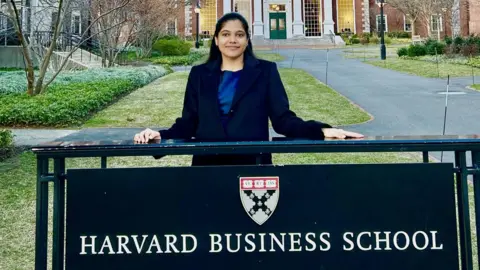### Harvard’s International Students Face Uncertainty Amid Policy Changes
In a shocking development for students at Harvard University, recent political decisions have created an atmosphere of anxiety and uncertainty, particularly among the international student community. As articulated by Shreya Mishra Reddy, an incoming graduate of the executive leadership program, her dream of graduating has come into jeopardy due to the Trump administration’s controversial directive to halt the enrollment of international students at Harvard. The announcement has left students like Reddy feeling stuck and disheartened.
When Reddy, hailing from India, received her acceptance letter in 2023, it marked a moment of undeniable pride for her family. Harvard has long been regarded as the pinnacle of educational achievement in India, widely celebrated as aspirational. However, as her graduation date approaches, Reddy confronts the painful reality of potentially not completing her degree this July. This news weighed heavily on her family, who are still grappling with the implications. Harvard has indicated that it sees the government’s actions as “unlawful” and may consider legal measures to address the challenges posed by these policy shifts.
The challenges are not unique to Reddy. With approximately 6,800 international students comprising over 27% of Harvard’s total enrollment, this community plays a significant role in the university’s financial ecosystem. The precariousness of their situation exemplifies a broader concern, as each student—whether awaiting enrollment, in the midst of a degree program, or nearing graduation—faces an uncertain future, particularly regarding work opportunities tied to their student visas.
For students like Reddy, the hope remains that the university will advocate on their behalf. Harvard has expressed its commitment to supporting international scholars, emphasizing their invaluable contributions to the campus and society at large. However, immediate concerns loom large, especially for those already in the United States who might need to transfer to other universities to maintain their visa status.
The repercussions of this order echo throughout the broader landscape of higher education in the United States, affecting an estimated million international students who may face similar restrictions. The Trump administration’s stringent measures have disproportionately targeted schools experiencing pro-Palestinian activism and protests, further complicating the academic environment.
The administration’s actions include freezing nearly $3 billion in federal grants intended for Harvard, a move the institution is contesting in court. Furthermore, controversial claims of collusion with the Chinese Communist Party have led to increasing tensions, with implications that reach internationally as countries like China strongly condemn such politicization of education.
Amid these distressing circumstances, student voices highlight the profound impact of the uncertainty. Kat Xie, a second-year STEM student from China, expressed her shock upon hearing the administration’s latest announcement, indicating both her astonishment and a sense of foreboding that the worst might happen. She noted that although she had mentally prepared for potential challenges, the options available for remaining in the U.S. were fraught with difficulties and expenses.
Further illustrating the pervasive fear among international students, Abdullah Shahid Sial from Pakistan described the experience as both “ridiculous and dehumanizing.” As one of just two Pakistani undergraduates at Harvard for the academic year, his achievement brought great pride to his family. However, now he grapples with the anxiety that clouds the future of his academic journey.
For students like Jiang Fangzhou from New Zealand, the ramifications extend beyond personal anxieties; they consider the cohort of incoming students whose lives have been uprooted by unexpected policy changes. Potential students who had chosen to attend Harvard are finding their academic paths disrupted, leaving them in a state of flux as they navigate their next steps.
As these students confront a challenging landscape marked by political machinations, they seek assurances regarding their educational ambitions and the welcoming environment they once anticipated. Confidence in the opportunities presented by an international education feels increasingly fragile, as the situation evolves and unfolds, leaving the futures of many in a precarious balance.



